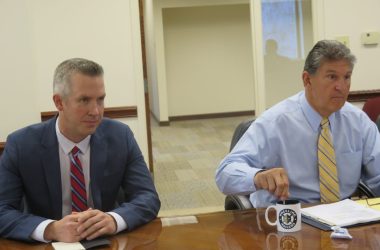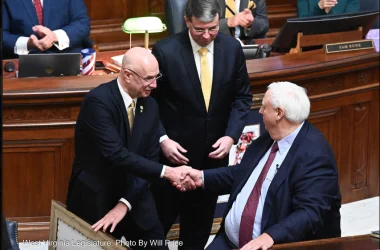By LACIE PIERSON
The Herald-Dispatch
CHARLESTON, W.Va. — When it comes to the question of substance abuse, West Virginians from the state’s deepest hollows all the way to its marble Capitol are looking for answers every day.
With a vote on one bill Tuesday, Sen. Ron Stollings, D-Boone, said he hoped to find answers to at least one question: How deep the state’s opioid epidemic has bled into the state’s K-12 school system.

Senate Bill 36 would allow for school nurses, along with teachers and school staff who are certified, to carry and administer opioid antagonists in school facilities, if they so choose.
The bill also would require school districts officials to keep record of each use of the opioid antagonists, more commonly referred to as naloxone, or its brand name, Narcan.
“We know that kids are willing to experiment,” Stollings said. “(The bill) mandates reporting, so we can get a handle on the question, ‘Are there overdoses happening in our school systems?’ That’s part of it.”
Under current state law, licensed school nurses are permitted to carry and administer naloxone, if a county board of education permits it.
If it’s signed into law, Senate Bill 36 would expand permission to carry naloxone to all 55 county districts, including private schools, without approval of the local board of education. It also would allow teachers who are properly certified to carry and administer naloxone if they see a student or adult in the school suffering an opioid overdose.
The bill also provides legal protection to those school nurses and staff who administer naloxone.
Naloxone is an anti-opioid drug that can reverse the effects of a heroin or pain medication overdose by blocking the depression of brain and respiratory functions that are limited by those drugs.
If SB 36 is signed into law, school districts would be responsible for purchasing their own naloxone, which is why Stollings said the law wouldn’t mandate school districts to carry the product. They can opt-in, but those districts that do carry it will have to report each naloxone use.
All public schools in Cabell County have stocked naloxone since the 2015-16 school year through a waiver from the West Virginia Department of Education, said Jedd Flowers, director of communications for Cabell County Schools.
In September 2016, the West Virginia Board of Education established the policy that allows county boards to determine whether school nurses can carry and administer naloxone.
Flowers didn’t have exact numbers, but he said overdoses of various types had occurred in Cabell County schools “over the years.” None of them were fatal.
Flowers said there still is cause for concern, given the circumstances of a 2016 calendar year that saw 1,163 non-fatal overdoses in Huntington, according to figures from Scott Lemley, with the Huntington Mayor’s Office of Drug Control and Policy.
“Of course, with the number of serious overdoses reported in the community lately, it is a very real possibility that we may have to administer naloxone sometime in the future to save a life,” Flowers said. “Besides students and staff, we have many parents and community members who come to school to drop off and pick up students; attend our ball games, concerts, and other school functions; or who have business and other interactions with our staff.”
Lemley said Monday he had no data showing any overdoses took place in any school, public or private, in 2016 in Cabell County.
Lemley said four overdoses were suffered by people 18 years or younger. All of them were non-fatal.
Of those four, Lemley said two of them were caused by opioids and could have been affected by naloxone.
The youngest overdose in the county in 2016 was suffered by an 11-year-old child, who overdosed on synthetic marijuana, which couldn’t be treated with naloxone, he said.
“That’s one where I guarantee naloxone won’t help,” Lemley said.
The fourth overdose was by an undetermined substance, Lemley said.
Lemley’s data also showed the average age of an overdose patient was 35 years. The 11-year-old was the youngest overdose patient, and the oldest overdose patient was 69 years old.
The West Virginia Senate will convene to vote on the bill at 11 a.m. today.
See more from The Herald-Dispatch





